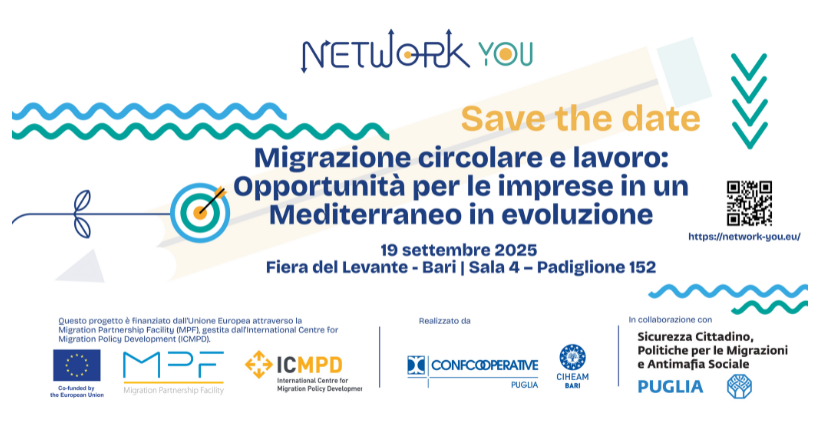
Il 18 e 19 settembre 2025 Bari ospiterà un’importante tappa del progetto NET-WORK YOU (Creation of a Skills Network to Increase Employment Opportunities for Young Egyptians in the Green Job Sector), iniziativa cofinanziata dall’Unione Europea e realizzata da Confcooperative Puglia e CIHEAM Bari, nell’ambito del Migration Partnership Facility implementato da ICMPD.
Il progetto NET-WORK YOU
Con una durata di 36 mesi, il progetto NET-WORK YOU mira a sviluppare un modello sostenibile di mobilità qualificata tra Italia ed Egitto, attraverso programmi di formazione e tirocini in Puglia per giovani egiziani, in particolare neolaureati in ICT e tecnici agricoli. L’iniziativa si concentra su tre ambiti strategici: agricoltura verde, digitale ed economia sostenibile, con l’obiettivo di rafforzare competenze professionali, aumentare l’occupabilità e creare un network mediterraneo multi-stakeholder capace di stimolare partenariati pubblico-privati e scambi di buone pratiche a livello nazionale ed europeo.
18 settembre: visite e confronto con il territorio
La prima giornata si aprirà al Campus Cosimo Lacirignola del CIHEAM Bari con la visita della delegazione internazionale a cui seguiranno i sopralluoghi a tre realtà pugliesi innovative: Planetek Italia, impresa benefit specializzata in geomatica, osservazione della Terra e software per missioni spaziali; Etnie Cooperativa Sociale, attiva dal 1998 per l’integrazione culturale e lavorativa dei cittadini stranieri; Sfrutta Zero, progetto mutualistico di autoproduzione di salsa di pomodoro nato per offrire dignità lavorativa a italiani disoccupati e migranti vittime di sfruttamento in agricoltura.
19 settembre: il convegno alla Fiera del Levante
Il giorno successivo, la delegazione parteciperà al convegno internazionale “Migrazione circolare e lavoro: Opportunità per le imprese in un Mediterraneo in evoluzione”, organizzato in collaborazione con il Dipartimento Sicurezza del Cittadino, Politiche per le migrazioni e Antimafia sociale della Regione Puglia, in programma dalle ore 10.00 alle 12.30 presso la Fiera del Levante (Sala 4 – Padiglione 152).
Dopo i saluti istituzionali di Michele Emiliano (Presidente Regione Puglia), Giorgio Mercuri (Presidente Confcooperative Puglia) e Biagio Di Terlizzi (Direttore CIHEAM Bari), il confronto sarà articolato in due sessioni:
Un ponte tra Puglia ed Egitto
Le due giornate si configurano come un’occasione strategica di dialogo e cooperazione tra Puglia ed Egitto, in cui istituzioni, imprese e società civile si incontrano per costruire percorsi comuni di sviluppo sostenibile e mobilità giovanile qualificata.
Con il progetto NET-WORK YOU, il CIHEAM Bari conferma il suo ruolo di facilitatore mediterraneo, promuovendo un modello innovativo di cooperazione capace di coniugare inclusione sociale, innovazione economica e valorizzazione delle competenze giovanili.
Per maggiori info sul progetto: https://network-you.eu/
Per partecipare in presenza all’evento: http://bit.ly/48hjwSo
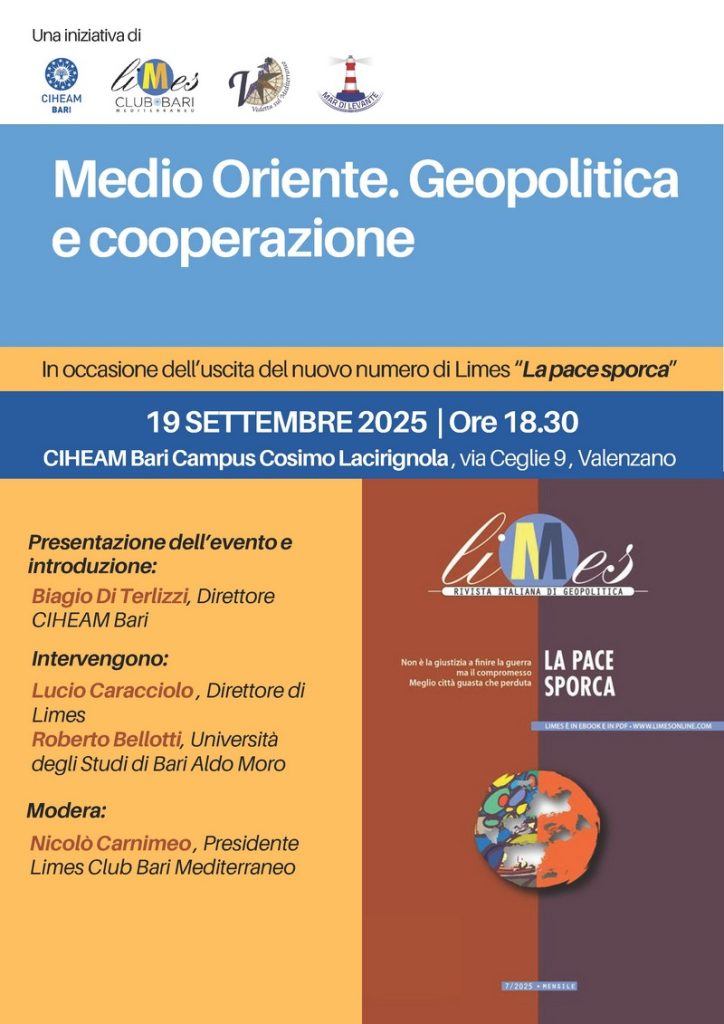
Il 19 settembre alle ore 18.30, nel Campus Cosimo Lacirignola del CIHEAM Bari, si terrà l’incontro Medio Oriente. Geopolitica e cooperazione, un’occasione per approfondire i fragili equilibri e la possibilità di cooperare in una delle aree più strategiche per il futuro del mondo.
Al dibattito interverranno Lucio Caracciolo, direttore di Limes, Roberto Bellotti neoeletto rettore dell’Università Aldo Moro di Bari, Biagio Di Terlizzi, direttore del CIHEAM Bari. A moderare sarà Nicolò Carnimeo, presidente del Limes Club Bari Mediterraneo.
L’iniziativa è promossa da Limes, Limes Club Bari Mediterraneo e CIHEAM Bari, in occasione dell’uscita de “La pace sporca”, il nuovo numero di Limes, rivista mensile italiana di geopolitica, fondata e diretta da Lucio Caracciolo.
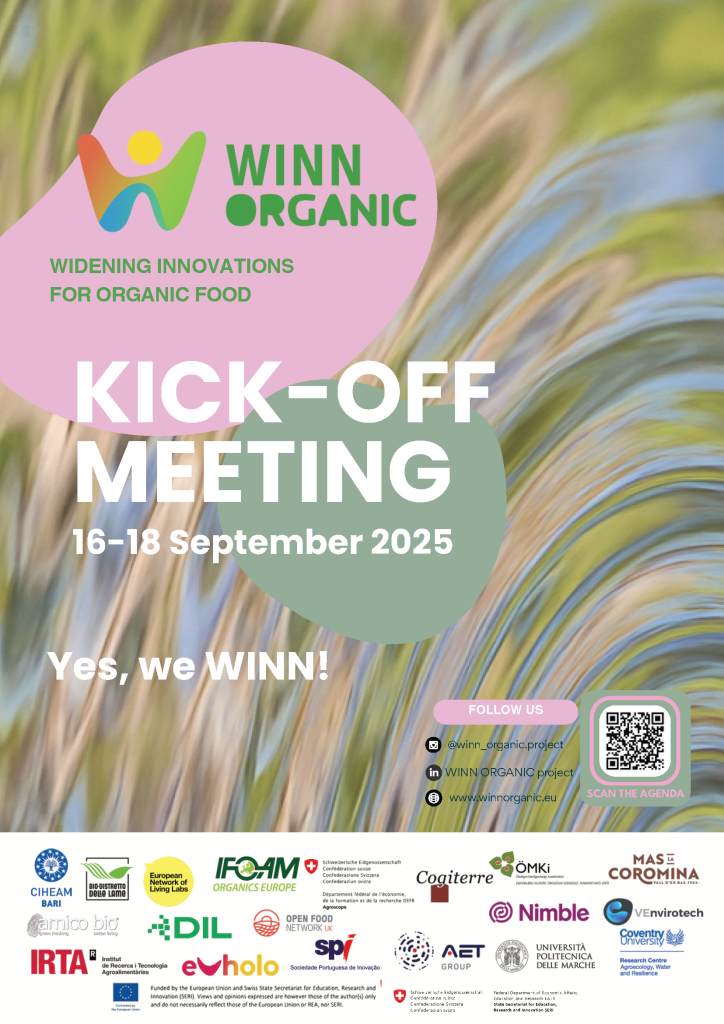
On September 16–18, 2025, CIHEAM Bari will host the Kick-off Meeting of WINN-ORGANIC – Widening INNovations for ORGANIC food, Horizon Europe project (Innovation Action) running over four years (2025–2029). The event will see the participation of Biagio Di Terlizzi, Director of CIHEAM Bari.
CIHEAM Bari will lead a consortium of 19 partners from nine countries (Italy, Spain, Portugal, the Netherlands, Germany, France, Hungary, the United Kingdom, and Switzerland). WINN-ORGANIC will establish eight Organic Food Innovation Hubs across Europe. These hubs will serve as spaces for co-creation and experimentation, connecting researchers, small producers, enterprises, policymakers, and citizens to design and disseminate innovative solutions:
The full meeting agenda is available at the following link: click here.
CIHEAM Bari, in collaboration with LUM University - Libera Università Mediterranea, School of Management - opens applications for the 2025-2026 International First Level Master in "Open Innovation & Youth Entrepreneurship in the Mediterranean Agrifood Sector". The Master, at its 7th edition, envisages the active involvement of national and international companies. So far, it has trained more than ninety managers of innovation.
The previous edition confirmed the longtime technical partnership with MIP, the innovation network gathering 10 different Mediterranean countries, ALMACUBE, spin-off of the University of Bologna specialised in Open Innovation, and LUM Strategy Innovation, the spin-off of the University “Ca’ Foscari” of Venice, service company focused on strategic innovation.
The Master, totally held in English and open to candidates from all over the world, aims to train a new generation of innovation managers, enhancing the entrepreneurial culture and contributing to the design, development and implementation of innovative projects within enterprises and organizations (innovation managers). Moreover, it is aimed at launching new entrepreneurial initiatives (start-ups) and providing consulting services meant to promote knowledge transfer through the introduction of business innovation processes and methods (innovation brokers).
The Master will stretch over one academic year, from January 2026 to October 2026, and awards 60 credits.
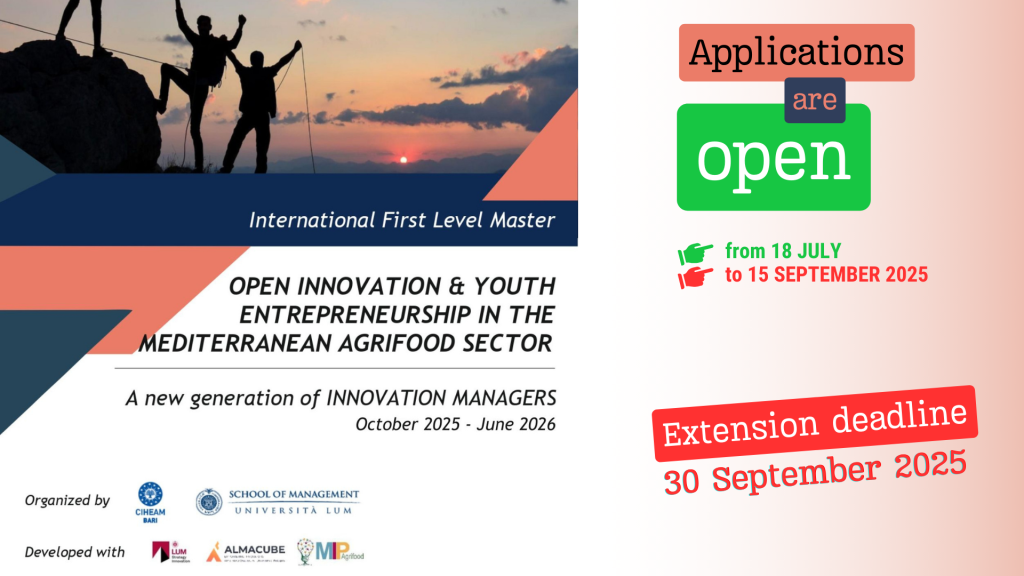
Applications will be open online from 18 July to 15 September 2025 (deadline extension: 30 September 2025) at the following link:
Candidates are required to have a B2 Level certificate of proficiency in English and at least a bachelor’s degree (3-years diploma) in any discipline.
Full and partial scholarships are available.
For further information, please refer to the Master’s webpage, section EDUCATION.
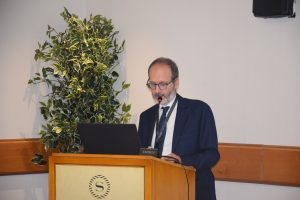
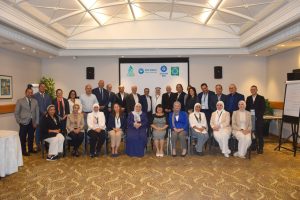
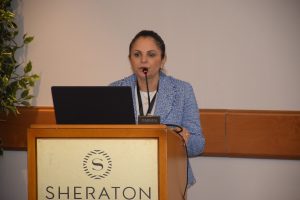
Si è svolto in questi giorni il primo incontro regionale del Progetto One Water ad Amman. In collaborazione con il Governo della Giordania, l’Arab Water Council e il CIHEAM Bari, il Comitato One Water ha organizzato l’incontro dedicato ai paesi del Mashreq.
I lavori sono stati aperti dalle relazioni del Segretario Generale del Ministero dell’Acqua e dell’Irrigazione della Giordania, Dr. Jihad Al-Mahameed, dal Segretario del Comitato One Water, Filippo M. Soccodato, e dal Segretario Generale dell’Arab Water Council, Hussein El-Hatfi.
Il programma si è articolato in presentazioni tecniche, tavole rotonde, gruppi di lavoro tematici e sessioni di sintesi.
Il primo giorno è stato dedicato al confronto sulla governance dell’acqua nei diversi Paesi, sullo stato di attuazione degli obiettivi dell’Agenda 2030 (in particolare SDG6) e sulla definizione di priorità strategiche e delle azioni concrete di cooperazione da sviluppare nelle successive fasi del progetto.
Nel secondo giorno si è proceduto all’approfondimento di due specifiche verticali: l’uso di acqua non convenzionale in agricoltura e la mitigazione e gestione dei rischi. È stato un primo momento di confronto, anche per condividere progetti e buone pratiche per la loro possibile applicazione e scalabilità in tutti i paesi del Mediterraneo.
Ai lavori hanno preso parte ministeri, autorità, università e stakeholder provenienti dai Paesi dell’area, tra cui Arabia Saudita, Egitto, Emirati Arabi Uniti, Giordania, Libano, Palestina e Siria.
Il Progetto mira a facilitare e sviluppare le azioni di cooperazione tra i paesi del Mediterraneo sulla governance dell'acqua, fondamentali per affrontare le sfide comuni legate alla gestione delle risorse idriche. Questi paesi condividono un clima simile e devono affrontare problemi comuni come la scarsità d'acqua, l'inquinamento e la gestione sostenibile delle risorse idriche. La cooperazione permette di scambiare conoscenze, tecnologie e migliori pratiche, migliorando così l'efficienza e l'efficacia delle politiche idriche. Mediante la collaborazione transnazionale potranno essere pianificate strategie comuni per la protezione degli ecosistemi acquatici e la promozione di uno sviluppo sostenibile, contribuendo alla stabilità e alla prosperità dell’intera regione.
CIHEAM Bari is organizing the 3rd edition of the Advanced Specialized Course in "Precision Agriculture for the Mediterranean Region," aimed at training professionals from ministries and producer associations in Mediterranean and African countries with basic knowledge of Information Technology.
An opening workshop will also be held online, as part of the first unit of the course (8–12 September 2025), to broaden participation beyond the selected course attendees.
The workshop will feature a series of seminars by experts from academia, research institutes, and business associations, covering the following topics: general concepts of precision agriculture with a multiscale and multisectoral approach, opportunities and constraints, key technologies, CIHEAM innovations, adaptation to the Southern Mediterranean context, and the role of technology providers and service companies.
Those interested in the opening workshop can register via the following link, specifying the days they wish to attend.
Siamo lieti di aver contribuito alla realizzazione del volume “Con la grinta e con il cuore”, e ringraziamo sentitamente l’autore, l’Ambasciatore Marco Di Ruzza, per aver voluto condividere con il CIHEAM Bari questa significativa esperienza.
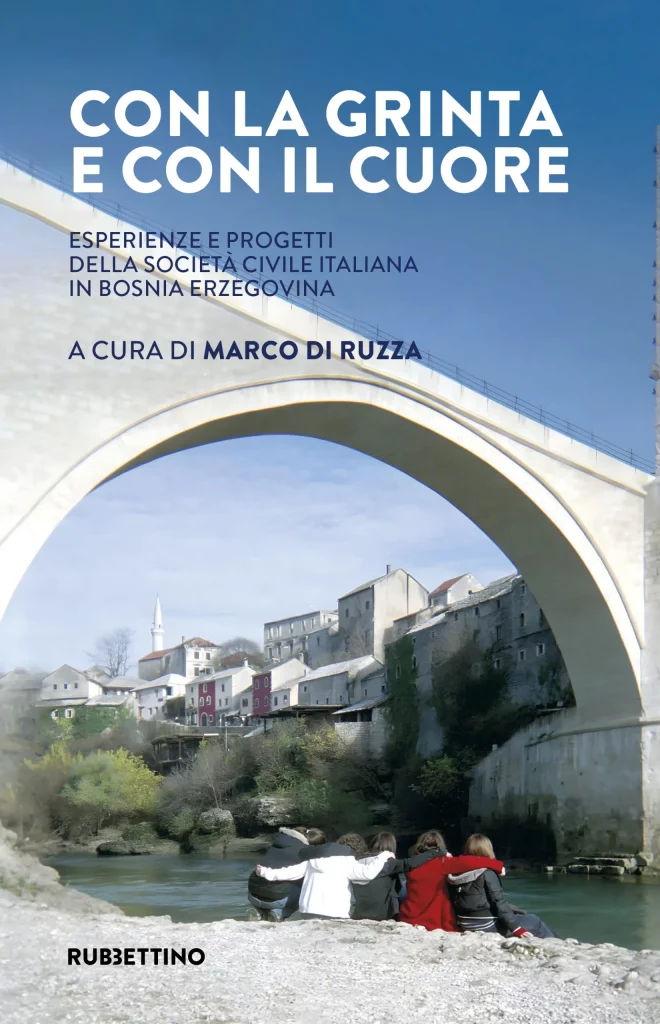
Il libro è un viaggio autentico e coinvolgente nella Bosnia Erzegovina, Paese dalla straordinaria ricchezza culturale, ma ancora segnato dalle ferite del conflitto degli anni ’90. L’opera racconta con lucidità e umanità le sfide e le speranze di una terra sospesa tra memoria e futuro, e lo fa attraverso la testimonianza diretta di un diplomatico che ha vissuto intensamente il proprio ruolo istituzionale a Sarajevo tra il 2021 e il 2024.
Nel solco dell’impegno italiano per l’integrazione dei Balcani occidentali nell’Unione Europea, Di Ruzza restituisce uno sguardo partecipe e profondo sui legami politici, economici e culturali che uniscono l’Italia alla Bosnia Erzegovina, valorizzando anche il ruolo silenzioso ma essenziale della società civile italiana attiva nel Paese.
Condividiamo con convinzione i valori che attraversano queste pagine: il dialogo, la cooperazione, il rispetto della diversità e l’investimento nelle nuove generazioni. È proprio con questo spirito che il CIHEAM Bari continuerà a lavorare per la pace, la coesione e lo sviluppo sostenibile dell’area balcanica.
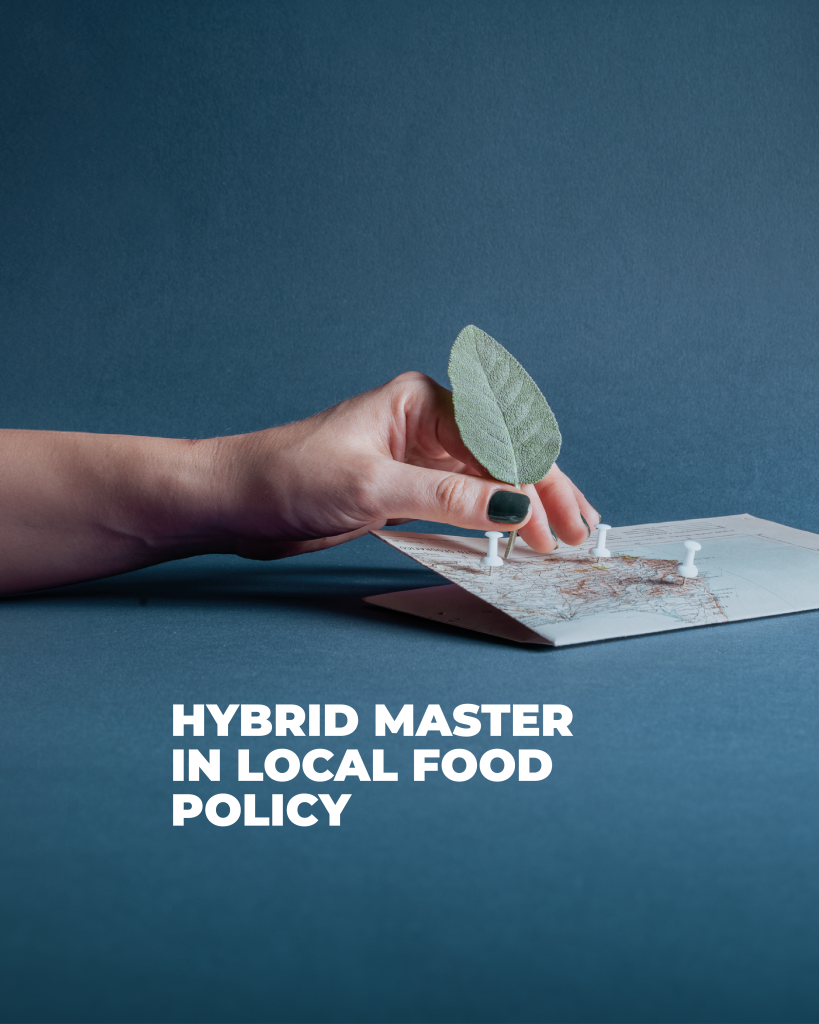
The programme specializes in cultivating expertise in local food systems and policies and provides students with skills and knowledge to drive significant advancements in food policy analysis, sustainable food management, and advocacy for equitable food practices. By focusing on local initiatives with global impacts, the course opens pathways to roles in food policy analysis, sustainable food planning, and innovative food enterprise management.
The Master, totally held in English, is open to candidates from all over the world. It stretches from January to December 2026 and combines intensive on-site classes and workshops with online sessions.
The intensive face-to-face activities will be held on the CIHEAM Bari campus.
The Application deadline is: 5 NOVEMBER 2025.
For further information, please click on the following links: